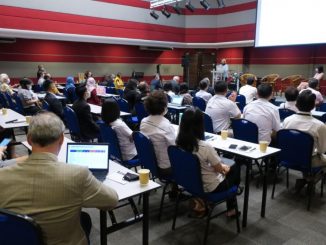
On Saturday 21st Oct 2017, as many as thirty-two participants were involved in the 5th Encubator Coffee chat, hosted by Christian Marketplace Group the Encubators. The talk was presented by Mr Cheong Seng Gee, who is the Executive Director and founding partner of P.O.D. Advisory Sdn Bhd (a Human Resource Consultancy Firm), as well as senior adviser to the Graduate Christian Fellowship (GCF) of Malaysia.
It was an event to foster networks among investors and entrepreneur groups as well as impart Christian values to the secular marketplace. Those who attended were from a diverse group of people, coming different stages of life, as well as coming from different areas of the marketplace. Some had just begun their own start up; others were experienced entrepreneurs as well as investors.
Mr Seng Gee presented a talk in regards to Venturing into the World of Innovative Financing and VC (Venture Capital).

The main focus was to compare as well as contrast the way traditional business and current digital business were run. The main idea, as quoted by Mr Natarajan Chandrasekaran, the CEO and MD of Tata Consulting Services, is that going digital is no longer an option but a default.
The reason was because in light of the modern day digital economy, doing business online, using both smartphone and computer is the way to go. Seng Gee quoted examples of Uber is world’s largest taxi company that owns no vehicles, Facebook is the world’s most popular media company yet does not create any content and Alibaba, the world’s most popular retailer which holds no inventory.
Even though they are secular, these companies show a common trait, they are innovative and consumer oriented, their disruptive approach challenges the norm and they meet the consumer needs by dealing with their “pain points” or exploiting the “opportunistic spaces”. Despite being asset light, these companies are able to sustain earnings significant growth.

As such there were many business insights that could be taken from these company’s despite being secular.
As written also in the Bible,
Luke 16:8
For the sons of this age are shrewder in dealing with their own kind than are the sons of light.
So some of their strategies may benefit Christian entrepreneurs.
He then explained how digital business thrive using certain resources that is different from traditional business, which are the Social Media, Crowd Funding, P2P (Peer-to-Peer Funding), Venture Capital, Private Equity.
But the real highlight of the talk which was Angel Investing/Angel Investors, aka business angel.
Despite its name, Angel Investing is not a Christian concept in business. In fact, it is a very well-known secular way of funding where the project is funded by informal investor, private investor or seed investor, who are often retired entrepreneurs or corporate executives.
Seng Kee explained that is Encubator’s goal to develop the concept of Angel Investment further, doing it differently, more than just that of the secular world.

As an angel investor from a Christian perspective, we need to see beyond just maximizing financial returns in regards to their investment, but also invest towards the kingdom businesses which will have a spiritual, social, economic and environmental impact on our society.
While the concept of Angel Investing may be a secular business practice it does not mean that as Christians should have nothing to do with the secular business world. As written also in the Bible,
Luke 16:9 – I tell you, use worldly wealth to make friends for yourselves, so that when it is gone, they will welcome you into eternal dwellings.
As such we as believers must also consider the possibilities of having business partners and practices that are from the outside world yet which are not against any commands of Christ. And the main end of making money is not for our own gratification, but for the furtherance of God’s Kingdom, as well as helping the poor and needy, and our basic living needs.

After all, like Luke says
Luke 16:11
If, then, you have not been faithful with worldly wealth, who will entrust you with true riches?
To this end, Seng Gee ended the talk by posing a number of questions for the audience to ponder with regards to the stewardship of the resources God has entrusted to each of us.
- Am I ploughing in growing Kingdom or Biblical businesses or providing seed capital merely for high returns or both?
- What is the vision for investing in Christian SMEs? For profit or not for profit? For ethical considerations?
- Is ESG (Environmental, Sustainability and Governance) the minimum criteria for investment?
- What about forgiveness of debt or equity, especially in genuine business failures?
- Is best business practices equivalent to ethical business? What about considerations of other stakeholders e.g. employee’s welfare, giving back to society beyond CSR, etc?
- Matching – matching mentors and mentorees based on business expertise or spiritual-moral compass or both? Which has the higher weightage? How would these criteria be monitored?
- How can pitching be redefined from a competitive presentation to a genuine business case presentation whereby there is a genuine desire to extend help by the investor to the genuine investee apart from financial returns?
- What key biblical principles will form the guidelines of Angel Investment with a difference?
- In short, can we as potential Angel Investors practice the biblical principle of the Emmaus Walk with the investees?
As such in everything, we must remember that we do it for the glory of God.
1 Corinthians 10:31
So whether you eat or drink or whatever you do, do it all to the glory of God.
|Share The Good News|
Chris Qwk




Leave a Reply